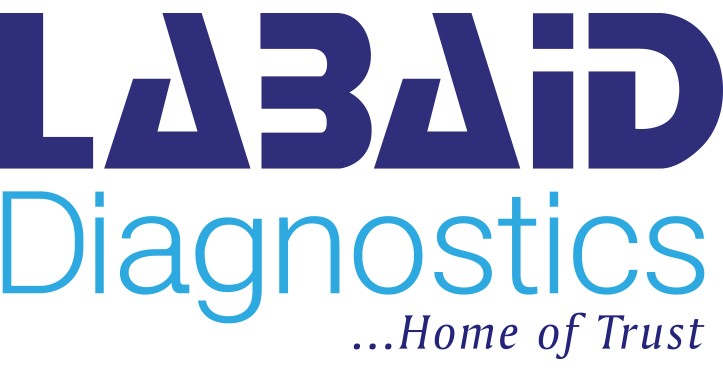Heart Disease - Symptoms, Diagnosis, Test
Do you sweat, have irregular heart beat and shortness of breath? These might be signs of Heart Diseases.
Overview
Heart disease is any condition that affects your heart such as

Coronary Artery Disease

Valvular Heart Disease

Arrhythmia Disease

Cardiomyopathy Disease

Congenital Heart Defects
- Coronary artery disease that affects the arteries. It is the most common type of heart disease.
- Valvular Heart Disease that affects the function of the valves which regulates blood flow in and out of the heart
- Arrhythmia that affects the electrical conduction
- Cardiomyopathy that affects how the heart muscles squeeze
- Congenital heart defects that develop before birth
Symptoms
Common symptoms of heart disease may include:
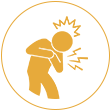
Chest pain
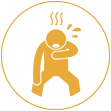
Shortness of breath
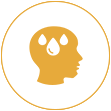
Sweating
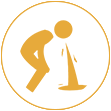
Nausea
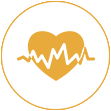
Irregular Heart Beat
- Chest pain
It's a discomfort caused when there is less supply of oxygen-rich blood to our heart. It may feel like pressure, crushing or squeezing in your chest. - Shortness of Breath
Shortness of breath, or dyspnea, is an uncomfortable condition that makes it hard to completely get air into your lungs. Problems with lungs and heart can harm your breathing. - Nausea
A discomfort that creates an urge to vomit. If its prolonged, it can be a sign of health disease. - Sweating
If there is excessive sweating more than usual without an involvement of any physical activity or hot conditions than it could be an early sign of heart problems. - Irregular Heart Beat
It's a change in heart beat frequency and occur when the electrical signals that coordinate with heart beat do not function properly.
Are you at risk for heart disease?
Factors that can put you at increased risk for heart disease are:

Smoking
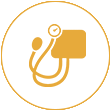
Hypertension

High Cholesterol
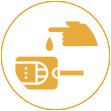
Diabetes

Family History of heart problems
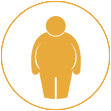
Obesity
- Smoking
The action or habit of inhaling and exhaling the smoke of toxic substances like tobacco or a drug. - Hypertension
Hypertension is also called high blood pressure. It can lead to severe health complications and increase the risk of heart disease, stroke, and sometimes death. - High Cholesterol
High blood cholesterol is a condition that causes the levels of certain bad fats, or lipids, to be too high in the blood and is caused by lifestyle factors, such as diet. - Diabetes
A disease in which the body’s ability to produce or respond to the hormone insulin is impaired, resulting in abnormal metabolism of carbohydrates and elevated levels of glucose in the blood. - Family history of Heart Diseases
A family history of heart disease is generally defined by having a first-degree male relative (i.e., father or brother) who had a heart attack by age 55, or a first-degree female relative (i.e., mother or sister) by age 65. - Obesity
The state of being well above one's normal weight. A person has traditionally been considered to be obese if they are more than 20 percent over their ideal weight.
Diagnosis
There are various tests used to diagnose heart disease. The doctor may start by asking
- Personal and Family medical history
- Current and past symptoms
- Laboratory tests and an electrocardiogram.
Laboratory Tests
The Laboratory tests include blood tests to determine the risk of heart disease and to evaluate other systems of the body that can affect your cardiovascular health.
Salient Blood Tests for diagnosing Heart Disease
- Total cholesterol
- LDL Cholesterol
- HDL Cholesterol
- Triglycerides
- Lipoprotein (a); Lp (a)
The test is used to identify an elevated level of Lipoprotein (a) that carries cholesterol in the blood. The test evaluates the risk of developing Cardiovascular disease (CVD). - C-reactive protein (CRP)
C-reactive protein (CRP) is produced by the Liver as part of the body's response to injury or infection. The test measures the amount of CRP in the blood to detect inflammation due to acute conditions, monitor the severity of disease in chronic conditions and helps create an overall picture of heart health. - Homocysteine
Homocysteine is used to build and maintain tissue. However, too much Homocysteine may increase the risk of heart disease and stroke. This test is usually ordered if you have a high risk of developing heart disease or have a family history of heart disease. It is also used for cases of family history of heart disease but no other known risk factors. - HsCRP
New age test to assess the risk of developing heart attack, stroke. It accurately measures low but persistent levels of inflammation in the body that is associated with Atherosclerosis - CK-MB
Creatine kinase-MB (CK-MB) is a form of an enzyme found primarily in heart muscle cells. This test measures CK-MB in the blood. CK-MB will typically only be present in significant amounts when the heart is damaged. - Troponin - T, I (High Sensitive)
High-sensitivity troponin tests are primarily ordered to help diagnose a heart attack and rule out other conditions with similar signs and symptoms. Levels of troponin can become elevated in the blood within 3 to 6 hours after heart injury and may remain elevated for 10 to 14 days. - BNP and NT-proBNP
B-type natriuretic peptide (BNP) and N-terminal pro b-type natriuretic peptide (NT-proBNP) are released by the body as a natural response to heart failure. Tests for BNP and NT-proBNP measure their levels in the blood to detect and evaluate heart failure. - APOLIPOPROTEINS A1 & B
Apo A-1 is the main protein component of HDL, the "good cholesterol". Apo B is the main protein associated with LDL, the "bad cholesterol".
Apo A-1 and Apo B are better indicators than LDL Cholesterol etc and determine the risk of developing cardiovascular disease (CVD)
